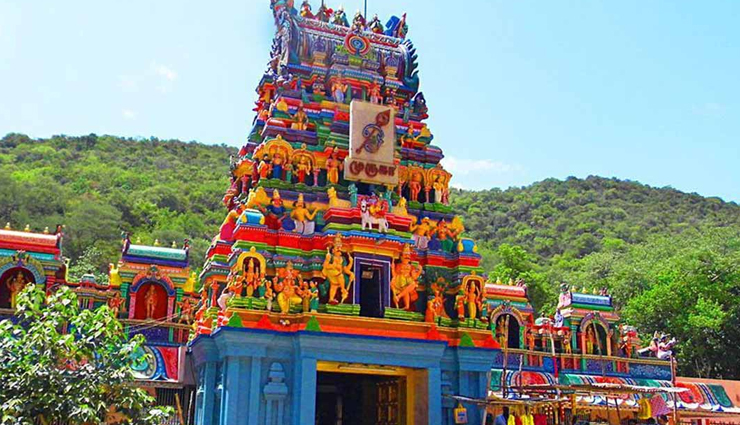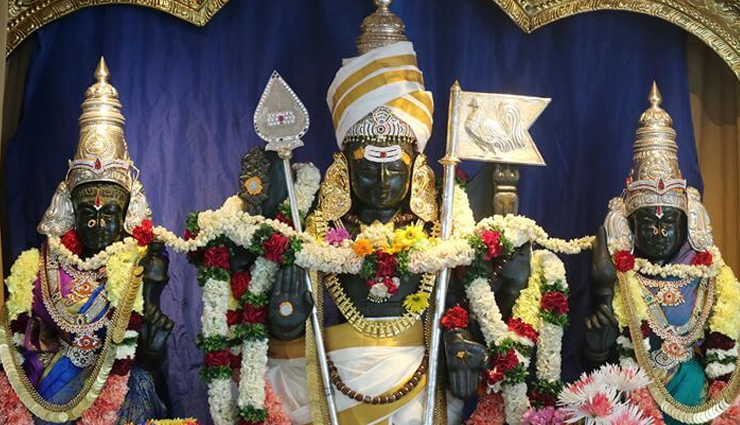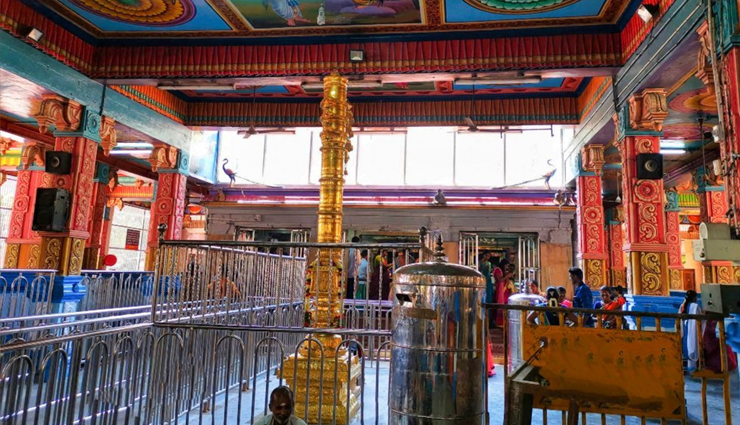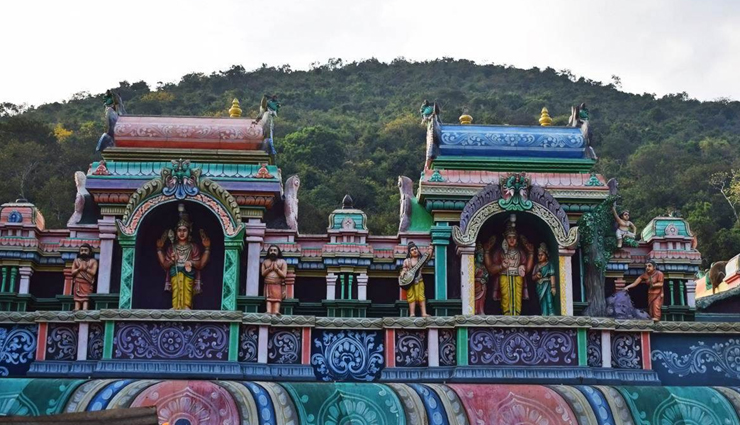Interesting Things To Know About Pazhamudircholai Murugan Temple
By: Priyanka Maheshwari Wed, 06 Sept 2023 12:50:48

On a hill adorned with vibrant green foliage and dense woods, you'll find one of Lord Muruga's sacred dwellings, known as the Pazhamudircholai Murugan Temple or Solaimalai Murugan Temple. Situated approximately twenty-five kilometers north of Madurai, India, it stands merely two and a half kilometers away from the Azhagar Kovil, a Vishnu temple.
Legend has it that the primary deity of this temple originally resided in Azhagar Kovil and was subsequently relocated to Pazhamudircholai during the reign of Thirumalai Nayak in Madurai.
For generations, the Vel, Lord Muruga's primary weapon—an ancient spear presented to him by Goddess Parvati—has been venerated as the principal deity in this shrine. According to Hindu mythology, Lord Murugan used the Vel to split the demon king Surapadman in half during their fierce battle. This temple is unique among the six holy abodes as it is where Lord Murugan blesses his devotees alongside both of his consorts, Goddess Valli and Devayani.
Renowned Tamil poet Nakkeerar immortalized Solaimalai in his Tamil poem Tirumurukaatruppadai. Although it is the sixth among the Arupadaiveedugal (the six abodes), it continues to attract numerous devotees from around the world due to its serene ambiance and the lush greenery that envelops the temple.

History Behind the Temple
The primary temple's establishment can be credited to Cheaman Perumal, a ruler from Kerala during the 7th Century AD. While the temple's roots trace back over a thousand years, the present-day structure we see today was erected relatively recently. In antiquity, the sole object of worship was the Vel, Lord Muruga's sacred spear. Initially, Pazhamudircholai housed only a stone-carved Vel. Subsequently, a wooden idol depicting Lord Muruga alongside his consorts, Valli and Deivanai, was introduced.
Stories of Saints
Avvaiyar, a renowned and legendary Tamil poetess, is a name associated with one of the most celebrated and revered works in Hindu folklore. Her extraordinary command of the language and her rich vocabulary set her writings apart, even among the most esteemed poets. This exceptional talent began to instill a sense of audacity in her.
According to ancient Hindu folklore, Lord Murugan, who held a deep regard for his devoted follower, decided to impart a lesson to Avvaiyar. He assumed the guise of a ten-year-old boy on the picturesque Solaimalai hill.
After accomplishing much in her lifetime, Avvaiyar was taking respite beneath a Naaval tree, pondering her future. Suddenly, a young boy materialized and perched on the tree. He inquired if she desired some fruit. Driven by hunger and thirst, she readily agreed.
The boy then posed an intriguing question, asking if she preferred a hot fruit or a cold one. Avvaiyar was perplexed but too fatigued to argue, so she chose the cold fruit. With a smile, the boy shook the tree, causing a cascade of fruits, all of which she collected.
As she began to clean the fruits, which were coated in sand, the boy innocently questioned why she was attempting to cool down a fruit that was already cold.
This incident left Avvaiyar humbled by the clever wordplay and poetic knowledge of the young boy. However, she remained skeptical of the boy's true identity, which was eventually revealed to her as Lord Murugan himself. She humbly bowed to the almighty and implored him to bestow upon her his boundless knowledge, as she had come to realize the profound power of eternal learning. With Lord Murugan's blessings, she embarked on her quest for limitless knowledge.

The Story of Muruga
Lord Muruga holds the esteemed position of the primary deity for many Tamil people worldwide. His narrative is extensively recounted in the expansive Mahapurana known as the Skanda Purana. Muruga, also recognized as Skanda or Kartikeya, is revered as the god presiding over both love and war.
According to legend, when the celestial gods found themselves tormented and oppressed by the demon King Surapadman, they sought assistance from Lord Vishnu. Lord Vishnu tasked Kamadeva with the mission to awaken Lord Shiva from his deep meditative state. This divine act led to the birth of Lord Murugan, whose sole purpose was to vanquish Surapadman and relieve the celestial gods from their suffering. Tamil literature delves further into the narrative, describing how Lord Muruga fell in love with Valli and subsequently married her, as well as how he wed Devayanai, the daughter of Lord Indra, following his victorious battle at Tiruchendur.
As conveyed in the verses of Arunagirinathar's songs, the divine responds to the supplications of devotees, alleviating their sorrows and fulfilling their desires.
People from far and wide visit this sacred place to offer prayers to Lord Murugan, seeking his blessings for various aspects of life, including weddings, children, and educational pursuits.

The diverse architecture
The Pazhamudircholai Murugan Temple serves as a splendid embodiment of ancient architectural richness, exuding a magical allure that seamlessly blends beauty. The Navaranga Mandapam, an intriguing structure constructed entirely from stone during the Nayak dynasty, stands supported by four pillars and boasts nine bays. Various parts of the temple bear a significant Pandiya influence, a testament to their contributions along with those of local leaders, different religious sects, and individual devotees.
The temple's tower itself is distinctive, and the serene presence of the Silambar River flowing nearby adds to its tranquil ambiance. Remarkably, the temple is also associated with rose apple trees linked to the legendary Tamil poetess, Avvaiyar, and Lord Muruga. These trees are said to thrive near the temple, yielding fruits typically from July to September. The temple's tree, however, bears fruit that ripens exclusively during the Skanda Sashti festival, occurring six days after Deepavali.
Atop the hill, one can find Noopura Ganga, a natural spring accompanied by a temple dedicated to Rakkayi Amman. Pilgrims visiting Pazhamudircholai never miss the chance to take a dip in this sacred spring, believed to have originated from Lord Vishnu's anklet, Tirumal, possessing mystical healing properties that bless one with health and wealth.
Numerous other springs and Theerthams grace this hill, with Hanuman Theertham and Garuda Theertham among them. The pond known as Moolavavi holds an air of mystery, as its water level rises during the summer and recedes in the winter. According to legend, the revered Siddha Agastya constructed this pond. Additionally, large numbers of fruit-eating bats can be observed near the temple, hanging from the branches, eagerly awaiting the ripening of fresh fruits.





